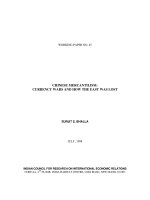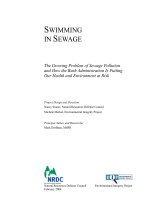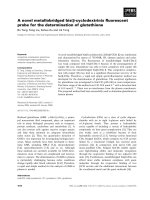OTHER PEOPLE''''S MONEY AND HOW THE BANKERS USE IT doc
Bạn đang xem bản rút gọn của tài liệu. Xem và tải ngay bản đầy đủ của tài liệu tại đây (246.62 KB, 7 trang )
CHAPTER I
CHAPTER II
CHAPTER III
CHAPTER IV
CHAPTER V
CHAPTER VI
CHAPTER VII
CHAPTER VIII
CHAPTER IX
CHAPTER X
OTHER PEOPLE'S MONEY AND HOW THE
BANKERS USE IT
BY LOUIS D. BRANDEIS
NEW YORK
FREDERICK A. STOKES COMPANY
PUBLISHERS
Copyright, 1913, 1914, by The McClure Publications
Copyright, 1914, by Frederick A. Stokes Company
All rights reserved
BY LOUIS D. BRANDEIS 1
March, 1911
PREFACE
While Louis D. Brandeis's series of articles on the money trust was running in Harper's Weekly many
inquiries came about publication in more accessible permanent form. Even without such urgence through the
mail, however, it would have been clear that these articles inevitably constituted a book, since they embodied
an analysis and a narrative by that mind which, on the great industrial movements of our era, is the most
expert in the United States. The inquiries meant that the attentive public recognized that here was a
contribution to history. Here was the clearest and most profound treatment ever published on that part of our
business development which, as President Wilson and other wise men have said, has come to constitute the
greatest of our problems. The story of our time is the story of industry. No scholar of the future will be able to
describe our era with authority unless he comprehends that expansion and concentration which followed the
harnessing of steam and electricity, the great uses of the change, and the great excesses. No historian of the
future, in my opinion, will find among our contemporary documents so masterful an analysis of why
concentration went astray. I am but one among many who look upon jMr. Brandeis as having, in the field of
economics, the most inventive and sound mind of our time. While his articles were running in Harper's
Weekly I had ample opportunity to know how widespread was the belief among intelligent men that this
brilliant diagnosis of our money trust was the most important contribution to current thought in many years.
"Great" is one of the words that I do not use loosely, and I look upon Mr. Brandeis as a great man. In the
composition of his intellect, one of the most important elements is his comprehension of figures. As one of the
leading financiers of the country said to me, "Mr. Brandeis's greatness as a lawyer is part of his greatness as a
mathematician." My views on this subject are sufficiently indicated in the following editorial in Harper's
Weekly.
ARITHMETIC
About five years before the Metropolitan Traction Company of New York went into the hands of a receiver,
Mr. Brindeis came down from lioston, and in a speech at Cooper Union prophesied that that company must
fail, leading bankers in New York and Boston were heartily recommending the stock to their customers. Mr.
Brandeis made his prophecy merely by analyzing the published figures. How did he win in the
Pinchot-Glavis-Ballinger controversy? In various ways, no doubt; but perhaps the most critical step was when
he calculated just how long it would take a fast worker to go through the Glavis-Ballinger record and make a
judgment of it; whereupon he decided that Mr. Wickersham could not have made his report at the time it was
stated to have been made, and therefore it must have been predated.
Most of Mr. Brandeis's other contributions to current history have involved arithmetic. When he succeeded in
preventing a raise in freight rates, it was through an exact analysis of cost. When he got Savings Bank
Insurance started in Massachusetts, it was by being able to figure what insurance ought to cost. When he made
the best contract between a city and a public utility that exists in this country, a definite grasp of the gas
business was necessary combined, of course, with the wisdom and originality that make a statesman. He
could not have invented the preferential shop if that new idea had not been founded on a precise knowledge of
the conditions in the garment trades. When he established before the United States Supreme Court the
constitutionality of legislation affecting women only, he relied much less upon reason than upon the amount
of knowledge displayed of what actually happens to women when they are overworked which, while not
arithmetic, is built on the same intellectual quality. Nearly two years before Mr. Mellen resigned from the
New Haven Railroad, Mr. Brandeis wrote to the present editor of this paper a private letter in which he said:
"When the New Haven reduces its dividends and Mellen resigns, the 'Decline of New Haven and Fall of
Mellen' will make a dramatic story of human interest with a moral or two including the evils of private
monopoly. Events cannot be long deferred, and possibly you may want to prepare for their coming.
BY LOUIS D. BRANDEIS 2
"Anticipating the future a little, I suggest the following as an epitaph or obituary notice:
"Mellen was a masterful man, resourceful, courageous, broad of view. He fired the imagination of New
England; but, being oblique of vision, merely distorted its judgment and silenced its conscience. For a while
he trampled with impunity on laws human and divine; but, as he was obsessed with the delusion that two and
two make five, he fell, at last, a victim to the relentless rules of humble arithmetic.
"'Remember, O Stranger, Arithmetic is the first of the sciences and the mother of safety.'"
The exposure of the bad financial management of the New Haven raikoad, more than anyother one thing, led
to the exposure and comprehension of the wasteful methods of big business all over the country and that
exposure of the New Haven was the almost single-handed work of Mr. Brandeis. He is a person who fights
against any odds while it is necessary to fight and stops fighting as soon as the fight is won. For a long time
very respectable and honest leaders of finance said that his charges against the New Haven were unsound and
inexcusable. He kept ahead. A year before the actual crash came, however, he ceased worrying, for he knew
the work had been carried far enough to complete itself. When someone asked him to take part in some little
controversy shortly before the collapse, he replied, "That fight does not need me any longer. Time and
arithmetic will do the rest."
This grasp of the concrete is combined in Mr. Brandeis with an equally distinguished grasp of bearing and
significance. His imagination is as notable as his understanding of business. In those accomplishments which
have given him his place in American life, the two sides of his mind have worked together. The arrangement
between the Gas Company and the City of Boston rests on one of the guiding principles of Mr. Brandeis' s
life, that no contract is good that is not advantageous to both parties to it. Behind his understanding of the
methods of obtaining insurance and the proper cost of it to the laboring man lay a philosophy of the vast
advantage to the fibre and energy of the community that would come from devising methods by which the
laboring classes could make themselves comfortable through their whole lives and thus perhaps making
unnecessary elaborate systems of state help. The most important ideas put forth in the Armstrong Committee
Report on insurance had been previously suggested by Mr. Brandeis, acting as counsel for the Equitable
policy holders. Business and the more important statesmanship were intimately combined in the management
of the Protocol in New York, which has done so much to improve conditions in the clothing industry. The
welfare of the laborer and his relation to his employer seems to Mr. Brandeis, as it does to all the most
competent thinkers today, to constitute the most important question we have to solve, and he won the case,
coming up to the Supreme Court of the United States, from Oregon, establishing the constitutionality of
special protective legislation for women. In the IMinimum Wage case, also from the State of Oregon, which is
about to be heard before the Supreme Court, he takes up what is really a logical sequence of the limitation of
women's hours in certain industries, since it would be a futile performance to limit their hours and then allow
their wages to be cut down in consequence. These industrial activities are in large part an expression of liis
deep and ever growing sympathy with the working people and understanding of them. Florence Kelley once
said: "No man since Lincoln has understood the common people as Louis Brandies does."
While the majority of Mr. Brandeis's great progressive achievements have been connected with the industrial
system, some have been political in a more limited sense. I worked with him through the Ballinger-Pinchot
controversy, and I never saw a grasp of detail more brilliantly combined with high constructive ethical and
political thinking. After the man who knew most about the details of the Interior Department had been
cross-examined by Mr. Brandeis he came and sat down by me and said: "Mr. Hapgood, I have no respect for
you. I do not think your motives in this agitation are good motives, but I want to say that you have a
wonderful lawyer. He knows as much about the Interior Department today as I do." In that controversy, the
power of the administration and of the ruling forces in the House and Senate were combined to protect
Secretary Ballinger and prevent the truth from coming to light. Mr. Brandeis, in leading the fight or the
conservation side, was constantly haunted by the idea that there was a mystery somewhere. The editorial
printed above hints at how ho solved the mystery, but it would require much more space to tell the other sides,
BY LOUIS D. BRANDEIS 3
the enthusiasm for conservation, the convincing arguments for higher standards in office, the connection of
this conspiracy with the country's larger needs. Seldom is an audience at a hearing so moved as it was by Mr.
Brandeis's final plea to the committee.
Possibly his work on railroads will turn out to be the most significant among the many things Mr. Brandeis
has done. His arguments in 1910-11 before the Interstate Commerce Commission against the raising of rates,
on the ground that the way for railroads to be more prosperous was to be more efficient, made efficiency a
national idea. It is a cardinal point in his philosophy that the only real progress toward a higher national life
will come through efficiency in all our activities. The seventy-eight questions addressed to the railroads by the
Interstate Commerce Commission in December, 1913, embody what is probably the most comprehensive
embodiment of his thought on the subject.
On nothing has he ever worked harder than on his diagnosis of the Money Trust, and when his life comes to
be written (I hope many years hence) this will be ranked with his railroad work for its effect in accelerating
industrial changes. It is indeed more than a coincidence that so many of the things he has been contending for
have come to pass. It is seldom that one man puts one idea, not to say many ideas, effectively before the
world, but it is no exaggeration to say that Mr. Brandeis is responsible for the now widespread recognition of
the inherent weakness of great size. He was the first person who set forth effectively the doctrine that there is
a limit to the size of greatest efficiency, and the successful demonstration of that truth is a profound
contribution to the subject of trusts. The demonstration is powerfully put in his testimony before the Senate
Committee in 1911, and it is powerfully put in this volume. In destroying the delusion that efficiency was a
common incident of size, he emphasized the possibility of efficiency through intensive development of the
individual, thus connecting this principle with his whole study of efficiency, and pointing the way to industrial
democracy.
Not less notable than the intellect and the constructive ability that have gone into Mr. Brandeis' s work are the
exceptional moral qualities. Any powerful and entirely sincere crusader must sacrifice much. Mr. Brandeis
has sacrificed much in money, in agreeableness of social life, in effort, and he has done it for principle and for
human happiness. His power of intensive work, his sustained interest and will, and his courage have been
necessary for leadership. No man could have done what he has done without being willing to devote his life to
making his dreams come true.
Nor should anyone make the mistake, because the labors of Mr. Brandeis and others have recently brought
about changes, that the system which was being attacked has been undermined. The currency bill has been
passed, and as these words are written, it looks as if a group of trust bills would be passed. But systems are not
ended in a day. Of the truths which are embodied in the essays printed in this book, some are being carried out
now, but it will be many, many years before the whole idea can be made effective; and there will, therefore,
be many, many years during which active citizens will be struggling for those principles which are here so
clearly, so eloquently, so conclusively set forth.
The articles reprinted here were all written before November, 1913. "The Failure of Banker Management"
appeared in Harper's Weekly Aug. 16, 1913; the other articles, between Nov. 22, 1913 and Dec. 17, 1914.
Norman Hapgood.
March, 1914.
OTHER PEOPLE'S MONEY AND HOW THE BANKERS USE IT
BY LOUIS D. BRANDEIS 4
CHAPTER I
OUR FINANCIAL OLIGARCHY
President Wilson, when Governor, declared in 1911:
"The great monopoly in this country is the money monopoly. So long as that exists, our old variety and
freedom and individual energy of development are out of the question. A great industrial nation is controlled
by its system of credit. Our system of credit is concentrated. The growth of the nation, therefore, and all our
activities are in the hands of a few men, who, even if their actions be honest and intended for the public
interest, are necessarily concentrated upon the great undertakings in which their own money is involved and
who, necessarily, by every reason of their own limitations, chill and check and destroy genuine economic
freedom. This is the greatest question of all; and to this, statesmen must address themselves with an earnest
determination to serve the long future and the true hberties of men."
The Pujo Committee appointed in 1912 found:
"Far more dangerous than all that has happened to us in the past in the way of ehmination of competition in
industry is the control of credit through the domination of these groups over our banks and industries."
"Whether under a different currency system the resources in our banks would be greater or less is
comparatively immaterial if they continue to be controlled by a small group."
"It is impossible that there should be competition with all the facilities for raising money or selling large
issues of bonds in the hands of these few bankers and their partners and allies, who together dominate the
financial policies of most of the existing systems The acts of this inner group, as here described, have
nevertheless been more destructive of competition than anything accomplished by the trusts, for they strike at
the very vitals of potential competition in every industry that is under their protection, a condition which if
permitted to continue, will render impossible all attempts to restore normal competitive conditions in the
industrial world
"If the arteries of credit now clogged well-nigh to choking by the obstructions created through the control of
these groups are opened so that they may be permitted freely to play their important part in the financial
system, competition in large enterprises will become possible and business can be conducted on its merits
instead of being subject to the tribute and the good will of this handful of self-constituted trustees of the
national prosperity."
The promise of New Freedom was joyously proclaimed in 1913.
The facts which the Pujo Investigating Committee and its able Counsel, Mr. Samuel Untermyer, have laid
before the country, show clearly the means by which a few men control the business of America. The report
proposes measures which promise some relief. Additional remedies will be proposed. Congress will soon be
called upon to act.
How shall the emancipation be wrought? On what lines shall we proceed? The facts, when fully understood,
will teach us.
THE DOMINANT ELEMENT
The dominant element in our financial oligarchy is the investment banker. Associated banks, trust companies
and life insurance companies are his tools. Controlled railroads, public service and industrial corporations are
his subjects. Though properly but middlemen, these bankers bestride as masters America's business world, so
CHAPTER I 5
that practically no large enterprise can be undertaken successfully without their participation or approval.
These bankers are, of course, able men possessed of large fortunes; but the most potent factor in their control
of business is not the possession of extraordinary ability or huge wealth. The key to their power is
Combination concentration intensive and comprehensive advancing on three distinct lines:
First: There is the obvious consolidation of banks and trust companies; the less obvious afhliations through
stockholdings, voting trusts and interlocking directorates of banking institutions which are not legally
connected; and the joint transactions, gentlemen's agreements, and "banking ethics" which eliminate
competition among the investment bankers.
Second: There is the consolidation of railroads into huge systems, the large combinations of public service
corporations and the formation of industrial trusts, which, by making businesses so "big" that local,
independent banking concerns cannot alone supply the necessary funds, has created dependence upon the
associated New York bankers.
But combination, however intensive, along these lines only, could not have produced the Money Trust
another and more potent factor of combination was added.
Third: Investment bankers, like J. P. Morgan & Co., dealers in bonds, stocks and notes, encroached upon the
functions of the three other classes of corporations with which their business brought them into contact. They
became the directing power in railroads, public service and industrial companies through which our great
business operations are conducted the makers of bonds and stocks. They became the directing power in the
life insurance companies, and other corporate reservoirs of the people's savings the buyers of bonds and
stocks. They became the directing power also in banks and trust companies the depositaries of the quick
capital of the country the life blood of business, with which they and others carried on their operations.
Thus four distinct functions, each essential to business. and each exercised, originally, by a distinct set of men,
became united in the investment banker. It is to this union of business functions that the existence of the
Money Trust is mainly due.*
The development of our financial oligarchy followed, in this respect, lines with which the history of political
despotism has familiarized us: usurpation, proceeding by gradual encroachment rather than by violent acts;
subtle and often long-concealed concentration of distinct functions, which are beneficent when separately
administered, and dangerous onl}" when combined in the same persons. It was by processes such as these that
Caisar Augustus became master of Rome. The makers of our own Constitution had in mind Uke dangers to
our political liberty when they provided so carefully for the separation of governmental powers.
THE PROPER SPHERE OF THE INVESTMENT BANKER
The original function of the investment banker was that of dealer in bonds, stocks and notes; buying mainly at
wholesale from corporations,
*ObviousIj' only a few of (ho invest nicrit bimkors oxorrisc this Krcat power; but many othors i)erf(jrin
important functions in the eystem, as hereinafter described. muDicipalities, states and governments which
need money, and selHng to those seeking investments. The banker performs, in this respect, the function of a
merchant; and the function is a very useful one. Large business enterprises are conducted generally by
corporations. The permanent capital of corporations is represented by bonds and stocks. The bonds and stocks
of the more important corporations are owned, in large part, by small investors, who do not participate in the
management of the company. Corporations require the aid of a banker-middleman, for they lack generally the
reputation and clientele essential to selling their own bonds and stocks direct to the investor. Investors in
corporate securities, also, require the services of a bankermiddleman. The number of securities upon the
market is very large. Only a part of these securities is listed on the New York Stock Exchange; but its listings
alone comprise about sixteen hundred different issues aggregating about $26,500,000,000, and each year new
CHAPTER I 6
listings are made averaging about two hundred and thu-ty-three to an amount of $1,500,000,000. For a small
investor to make an intelligent selection from these many corporate securities indeed, to pass an intelligent
judgment upon a single one is ordinarily impossible. He lacks the abilit}', the facilities, the training and the
time essential to a proper investigation. Unless his purchase is to be little better than a gamble, he needs the
advice of an expert, who, combining special knowledge with judgment, has the facilities and incentive to
make a thorough investigation. This dependence, both of corporations and of investors, upon the banker has
grown in recent years, since women and others who do not participate in the management, have become the
owners of so large a part of the stocks and bonds of our great corporations. Over half of the stockholders of
the American Sugar Refining Company and nearly half of the stockholders of the Pennsylvania Raliroad and
of the New York, New Haven & Hartford Railroad are women.
Good-will the possession by a dealer of numerous and valuable regular customers is always an important
element in merchandising. But in the business of selling bonds and stocks, it is of exceptional value, for the
very reason that the small investor relics so largely upon the banker's judgment. This confidential relation of
the banker to customers and the knowledge of the customers' private affairs acquired incidentally is often
a determining factor in the marketing of securities. With the advent of Big Business such good-will possessed
by the older banking houses, preeminently J. P. Morgan & Co. and their Philadelphia House called Drexel &
Co., by Lee, Higginson & Co. and Kidder, Peabody, & Co. of Boston, and by Kuhn, Loeb & Co. of New
York, became of enhanced importance. The volume of new security issues was greatly increased by huge
railroad consolidations, the development of the holding companies, and particularly by the formation of
industrial trusts. The rapidly accumulating savings of our people sought investment. The field of operations
for the dealer in securities was thus much enlarged. And, as the securities were new and untried, the services
of the investment banker were in great demand, and his powers and profits increased accordingly.
CONTROLLING THE SECURITY MAKERS
But this enlargement of their legitimate field of operations did not satisfy investment bankers. They were not
content merely to deal in securities. They desired to manufacture them also. They became promoters, or allied
themselves with promoters. Thus it was that J. P. Morgan
CHAPTER I 7









